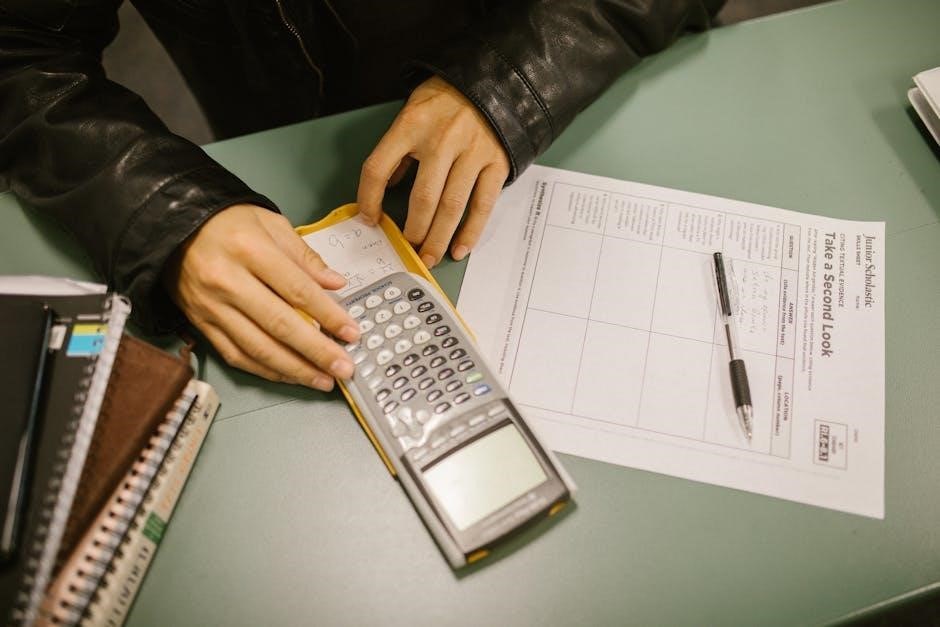
The PCA Test Questions and Answers PDF is a comprehensive resource for candidates preparing for the Personal Care Assistant certification exam. It offers a wide range of practice questions, covering essential topics such as daily living activities, infection control, and basic nursing skills. Designed to simulate the actual test experience, this PDF guide helps build confidence and reduces exam anxiety by familiarizing candidates with the format and content of the PCA exam. Regular practice with these questions ensures a thorough understanding of key concepts and improves problem-solving abilities, making it an invaluable tool for aspiring PCAs.
1.1 Overview of PCA Certification
PCA certification is a recognized credential for individuals seeking to validate their skills in providing quality patient care. The certification process involves both a written examination and a practical test, ensuring that candidates demonstrate both theoretical knowledge and hands-on competency. Achieving PCA certification highlights a commitment to professional excellence and equips individuals with the necessary skills to deliver effective care in various healthcare settings. It is a vital step for those aiming to advance their careers in patient support roles.
1.2 Importance of Practice Tests
Practice tests play a crucial role in preparing for the PCA certification exam. They provide candidates with a realistic simulation of the actual test experience, helping to identify knowledge gaps and improve time management. Regular use of practice tests enhances problem-solving skills, boosts confidence, and reduces exam anxiety. By familiarizing themselves with the format and content, candidates can approach the exam with greater assurance and readiness, ultimately improving their chances of success.

Structure of the PCA Test
The PCA test consists of a written examination with 100 questions and a practical test assessing hands-on skills like reinforcing dressings or using a condom catheter, ensuring comprehensive evaluation of both knowledge and abilities.
2.1 Written Examination Format
The written exam comprises 100 multiple-choice questions, with a passing score of 80 correct answers. It evaluates the candidate’s knowledge on PCA responsibilities, infection control, and basic nursing skills. The questions are designed to assess both understanding and application of concepts, ensuring candidates are well-prepared for real-life scenarios in patient care. Time management is crucial to complete all questions within the allotted time.
2.2 Practical Test Components
The practical test evaluates a candidate’s ability to perform hands-on care tasks, such as reinforcing dressings, using assistive devices, and maintaining patient safety. Each task is assessed as Pass or Fail, focusing on accuracy and adherence to care standards. Candidates must demonstrate competence in essential skills, showcasing their readiness to provide effective patient care in real-world scenarios.

Key Topics Covered in PCA Test Questions
The PCA test questions cover essential areas like assisting with daily activities, basic nursing skills, infection control, and safety measures, ensuring comprehensive preparation for real-world caregiving scenarios.
3.1 Daily Living Activities Assistance
PCA test questions emphasize assisting patients with daily living activities, such as bathing, dressing, and using the bathroom. These questions evaluate the ability to provide safe and dignified care, ensuring patients maintain independence and comfort. Topics include proper techniques for transferring, grooming, and feeding, as well as addressing specific needs like meal preparation and mobility aids, reflecting real-life caregiving scenarios.
3.2 Basic Nursing Skills and Procedures
PCA test questions assess proficiency in basic nursing skills, such as infection control, vital sign monitoring, and wound care assistance; These questions evaluate the ability to perform essential tasks like using protective equipment, maintaining patient hygiene, and safely assisting with medical procedures. Mastery of these skills is fundamental to providing effective, safe, and compassionate patient care in various clinical settings.
3.3 Infection Control and Safety Measures
Infection control and safety measures are critical components of PCA exam questions, focusing on preventing the spread of infections and ensuring patient safety. Topics include proper handwashing techniques, use of personal protective equipment (PPE), and sterilization procedures. Candidates are tested on their ability to identify and implement safety protocols, such as isolating contaminated materials and safely disposing of biohazardous waste, to maintain a hygienic environment for patient care.

Scoring and Passing Requirements
The PCA exam requires a minimum score of 70% to pass each section. Candidates who fail may retake the test, with training paced according to individual needs.
4.1 Minimum Score to Pass
To pass the PCA certification exam, candidates must achieve a minimum score of 70% in each section. This ensures competency in both written and practical skills. The test is designed to assess knowledge and abilities critically, with clear scoring guidelines to maintain certification standards. Candidates who fail may retake the exam, allowing flexibility for improvement based on individual needs and preparation levels.
4.2 Retaking the Test
Candidates who do not pass the PCA exam may retake the test after additional preparation. The retake process allows individuals to focus on weaker areas, improving their performance. Training and testing can be paced according to the candidate’s needs, ensuring they are well-prepared for subsequent attempts. This flexible approach supports continuous learning and helps candidates achieve the required certification standards effectively.

Tips for Success in the PCA Test
Practice consistently with sample questions to understand the test format and content. Focus on time management and building confidence to approach each question systematically and effectively.
5.1 Effective Study Strategies
Develop a structured study schedule, focusing on weak areas and utilizing PCA practice questions. Use flashcards for quick concept reviews and reinforce learning through repetitive practice. Prioritize understanding over memorization, ensuring a strong grasp of key topics. Regularly review and analyze sample questions to identify patterns and improve problem-solving skills. Consistency and organized study habits are key to achieving exam success.
5.2 Test-Taking Confidence and Mindset
Maintaining a positive mindset is crucial for success in the PCA exam. Stay calm and composed, trusting in your preparation. Approach each question systematically, avoiding guesswork. Focus on time management to ensure all sections are attempted. Building confidence through practice tests and understanding the exam format helps reduce anxiety. A confident mindset enhances your ability to perform optimally and achieve desired results.

Free PCA Test Questions and Answers PDF Resources
Access free PCA test questions and answers from reliable sources like Docsity and PracticeTestGeeks. These PDF resources offer realistic practice exams, covering essential topics like daily living activities and infection control, ensuring thorough preparation for the certification exam.
6.1 Where to Find Reliable Practice Materials
Reliable PCA practice materials are available on platforms like Docsity and PracticeTestGeeks, offering free and paid resources. These websites provide PDFs with realistic questions and answers, covering essential topics such as daily living activities and infection control. They also include guides and quizzes to help candidates prepare effectively for the certification exam. Using these resources ensures access to up-to-date and relevant study materials for success.
6.2 Benefits of Using PDF Formats
Using PDF formats for PCA test questions and answers offers portability and convenience, allowing candidates to study anytime, anywhere. PDFs provide a clean layout and retain formatting, ensuring clarity. They are easily accessible offline, making them ideal for candidates with limited internet access. Additionally, PDFs often include searchable content, enabling quick navigation and efficient review of key topics, enhancing overall preparation efficiency.

Common Challenges in PCA Tests
Common challenges in PCA tests include time management, understanding true/false questions, and applying knowledge in practical scenarios. Candidates may also face difficulties with exam anxiety and critical thinking.
7.1 Time Management During the Exam
Effective time management during the PCA exam is crucial to ensure all questions are attempted. Candidates should allocate time evenly to each section and avoid spending too long on a single question. Practicing with timed mock tests helps improve speed and accuracy, reducing stress and allowing for a systematic approach to the exam. Proper planning ensures optimal performance.
7.2 Understanding True or False Questions
True or False questions in the PCA exam require careful reading and comprehension. Candidates must analyze each statement thoroughly to determine its accuracy. These questions often test knowledge of critical care procedures and ethical standards. Consistent practice with sample questions helps improve the ability to distinguish between correct and incorrect statements, ensuring accuracy and confidence during the actual exam.

Role of a Personal Care Assistant (PCA)
A Personal Care Assistant (PCA) provides essential support with daily living activities, ensuring patients’ safety, comfort, and well-being. Their role is vital in assisting individuals with physical or cognitive limitations.
8.1 Responsibilities and Duties
A PCA’s primary responsibilities include assisting with daily living activities, such as bathing, dressing, and grooming. They also provide support with mobility, meal preparation, and light housekeeping. Additionally, PCs ensure a safe environment by monitoring for hazards and maintaining proper infection control. Their duties may also involve administering basic care under the supervision of healthcare professionals, ensuring patients’ comfort and dignity are upheld at all times.
8.2 Ethical Considerations in Patient Care
Ethical considerations in PCA practice emphasize respecting patient confidentiality, dignity, and autonomy. PCs must adhere to legal and ethical guidelines, ensuring patient safety and well-being. This includes maintaining professional boundaries, avoiding harm, and providing compassionate care. Effective communication and cultural sensitivity are also crucial. Upholding these principles fosters trust and ensures high-quality, person-centered care in all settings.
PCA Test Questions and Answers Examples
This section provides sample PCA exam questions, such as true/false scenarios about infection control and daily living activities. These examples help candidates understand the test format and content, ensuring they are well-prepared for the actual exam by practicing realistic questions and reviewing detailed answers.
9.1 Sample Questions from Past Exams
Sample questions from past PCA exams include scenarios like: “What is the primary role of a PCA?” or “True or False: Handwashing is the most effective infection control measure.” These questions cover topics such as daily living assistance, basic nursing skills, and safety protocols, providing candidates with a clear understanding of the exam’s focus and helping them assess their readiness for the actual test.
9.2 Analyzing Correct and Incorrect Answers
Analyzing correct and incorrect answers helps candidates understand their strengths and weaknesses. For example, a question about infection control might ask, “True or False: Handwashing is the most effective way to prevent infection spread?” The correct answer is “True,” as handwashing is a critical safety measure. Incorrect answers, such as “False,” indicate a need to review infection control practices. This analysis provides practical insights, improving overall exam performance and reducing errors in future attempts.

Final Preparation and Test Day Strategies
Final preparation involves reviewing key concepts and managing anxiety. On test day, stay calm, read questions carefully, and answer systematically to ensure success.
10.1 Reviewing Key Concepts
Reviewing key concepts is crucial for final preparation. Focus on understanding daily living activities, infection control, and basic nursing skills. Use practice tests to identify weak areas and reinforce knowledge. Flashcards and summaries can help retain information. Ensure familiarity with test formats, such as true/false and multiple-choice questions, to improve confidence and accuracy during the exam.
10.2 Managing Exam Anxiety
Managing exam anxiety is essential for optimal performance. Practice relaxation techniques like deep breathing or mindfulness to stay calm. Maintain a positive mindset and remind yourself of your preparation. Familiarize yourself with the test format using practice questions to reduce fear of the unknown. A well-rested and confident approach will help you tackle challenges effectively and achieve success in the PCA exam.
